 Employee Engagement Articles
Employee Engagement Articles
30+ Employee Focus Group Questions to Improve Your Team Communication
Employee focus group questions aren’t a common way to improve team comms, but they can be immensely powerful. Curious? Read this post!
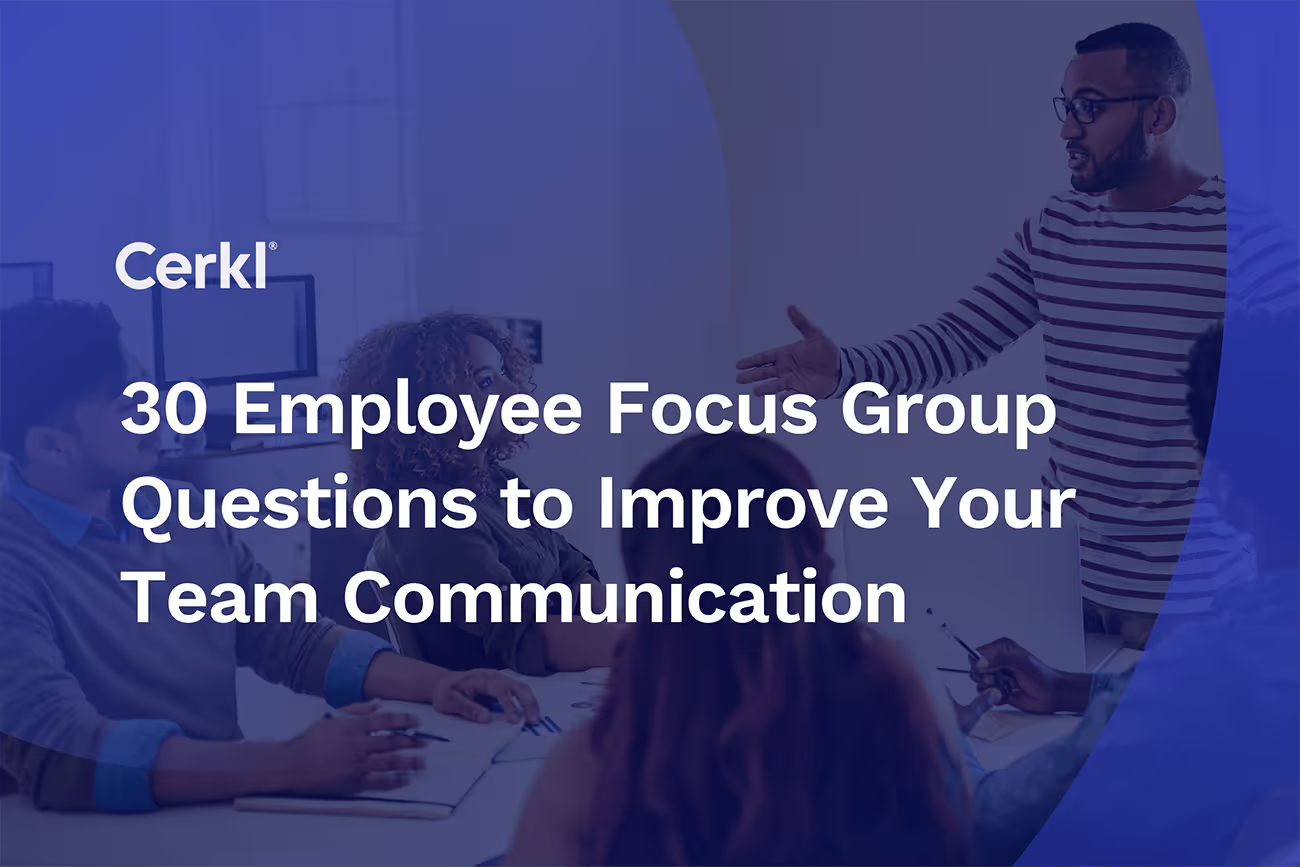
.avif)
Increase Engagement With Meaningful Surveys
It can be difficult to know what to include in an employee survey. That’s why we have created a template that you can use for FREE to ensure your employee surveys are engaging. Get the responses that will help you understand your audience.
Access Now →Employee focus groups and group interviews have been used as a research method for nearly a century. Initially, they were popular with large corporations for market research. Then companies realized how useful they were for obtaining in-depth knowledge about attitudes, perceptions, opinions, and beliefs. In the late 1990s and early 2000s, they were very popular for healthcare research.
Today, employee focus groups are often used by companies to boost employee engagement, gather feedback, generate ideas for improvement, and to uncover communication gaps.
Mercer’s Global Talent Trends 2024 talks about “Unlocking human potential in a machine-augmented world.” One issue they explored was what it means for an organization to be “digital by design.” In essence, “being a fully digital enterprise means cultivating a culture that promotes human-machine teaming in how people learn and collaborate, how data is harnessed, how innovation is encouraged, and how decisions are made.”
While 65% of executives stated their organization needs to be more digital, 31% identified technological disruption as the biggest short-term threat to their business this year. Nevertheless, most top C-suite executives said they were investing in a range of technologies from collaboration and control to insight and connection. Collaboration tools like Zoom, Slack, and Teams, are top of the list with 70% having invested in these in the past three years. Additionally, nearly half (48%) plan to start or continue investing in 2024. The rest of the tools and technologies rank from 44%-59% for investment during the past three years and 47%-56% for an intention to invest.
Defined as modern listening tools, digital focus groups and pulse surveys are somewhere in the middle. More executives (53%) said they planned to continue or start investing than the 45% who have invested in these tools in the past three years.
What are Employee Focus Groups?
An employee focus group is a relatively small, facilitated discussion group where employees discuss and share their thoughts and personal experiences on a specific topic. The facilitator guides the discussion, ensuring it stays on track and is productive. In the context of internal communication, an employee focus group provides a platform for a two-way conversation where you can learn from employees and use that knowledge to craft a more effective internal communication strategy.
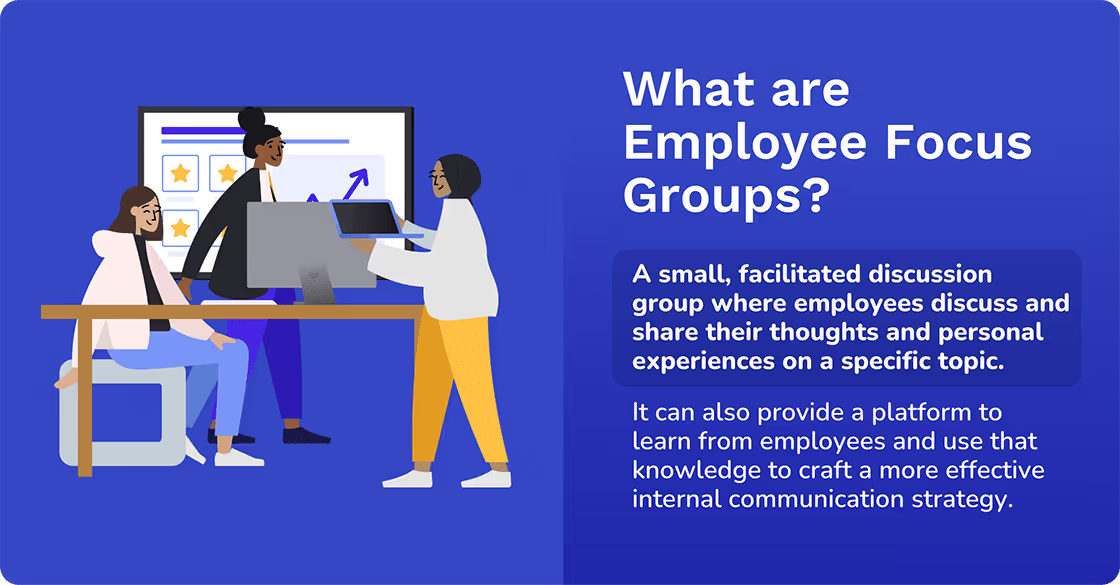
In a blog post, Beyond Survey Analytics: How DIalogue & Focus Groups Can Speed Action, Christian Roome, a senior consultant at Perceptyx, highlights the advantages of focus groups. He also explains the essential nuts and bolts of running employee focus groups, and advises how to analyze their results.
He suggests that the facilitator should either be a subject-matter expert or someone who is good at moderating groups and facilitating discussions.
“Traditional focus groups can facilitate intimate, unscripted discussions, allowing participants to voice their concerns in their own words. They serve as a space for both expansive brainstorming and targeted problem-solving, offering the chance to delve deeper into issues that may not have been evident through quantitative data alone. These discussions are particularly beneficial when there is a specific subject matter in focus, such as system efficiency or career development, and when participants constitute a defined subset of the workforce well-versed in that particular area.”
Christian Broome
He also points out that the research method is qualitative and not quantitative. “You do not have to talk to everyone.” But the key is to “transform nebulous conversations into a structured set of insights. These can serve as invaluable inputs into your action planning, allowing you to address organizational challenges with a nuanced understanding that is both empathetic and evidence-based.”
Free Employee Engagement Survey Template to Boost Productivity
Craft effective surveys to measure employee sentiment and boost engagement
.avif)
Download Free
Why are Focus Groups Important for Internal Communication and Engagement?
Focus groups offer valuable insights into employee perceptions of your communication channels, frequency, and content. They can help you identify:
- Communication gaps: Are there areas where employees feel uninformed? When you ask the right employee focus group questions the discussion can help you identify areas where employees feel like information isn't flowing clearly. They can also help you identify where messages might be getting lost in translation.
- Preferred communication channels: Do employees prefer email, company-wide meetings, or an internal communication platform? Employee focus groups enable those working within and organization to share their preferred methods for receiving information, whether it's email, company-wide meetings, or a dedicated communication platform.
- Employee engagement levels: Are employees actively participating in communication channels? By actively soliciting feedback on employee engagement, you show that you value their opinions and are committed to improving communication. This informal research platform can provide answers that you might not get from a standard employee engagement survey.
- Areas for improvement: What can you do to improve the clarity, timeliness, and relevance of your communication? Employees on the ground floor often have valuable suggestions for how to make internal communication more effective. Employee focus groups provide the opportunity to find out what they think and suggest.
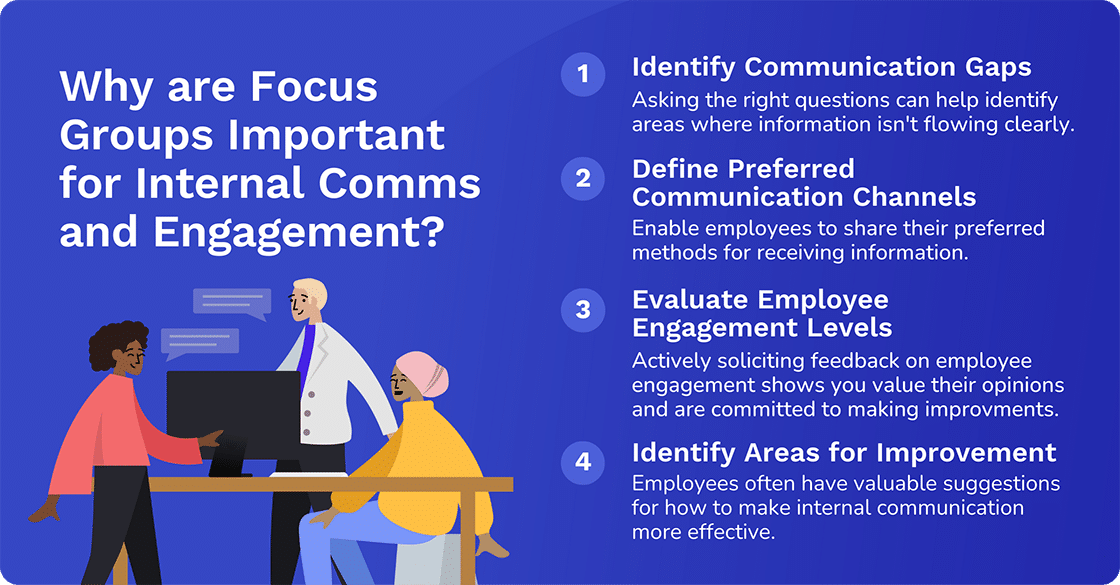
How to Conduct a Virtual Employee Focus Group
You can run employee focus groups in person or you can create virtual focus. The latter is obviously the best option for remote workers. If you opt for a virtual employee focus group, Christian Broome’s advice is not to try and mix in-person and virtual group members. A key reason is that if the facilitator or moderator is present in the room with in-person respondents, he or she may be more likely to favor them unconsciously.
Here's how to conduct a virtual employee focus group effectively.
Decide on Size
A good rule of thumb is to opt for 8-12 participants with reasonably diverse perspectives about the topic up for discussion. If there is less than this, it stands to reason that there will be less variety in terms of input. If there are more, it can be challenging for everyone to have their say.
Promise Confidentiality
Even if everyone in the group knows each other, you need to keep comments within the group. Ensure that everyone agrees that they will treat the discussion with the utmost confidence. This will encourage open dialogue and also mitigate any fear employees may have of repercussions if they express unpopular or different opinions. You might also offer the option of employees sharing insights privately after the focus group.
Choose an Internal Communication Platform
Before conducting a virtual employee focus group, send questions in advance via email so participants come prepared. You can always add to these once the group is in session. In fact, in most cases, you should. That’s why employee focus groups need a facilitator.
Choose a Video Conferencing Platform
Select a user-friendly video conferencing platform like Zoom or Google Meet. Make sure everyone invited to the group has access.
Set Clear Objectives
Define what you want to learn from the focus group. They need to know in advance. Not specifics, but in general terms. For example, you can say that questions will focus on employee engagement and the quality of internal newsletters. You might even say that you plan to use the focus group as an informal, anonymous employee engagement survey.
Decide on a Good Focus Group Mix
You can recruit a diverse group, aiming for a mix of roles, departments, and experience levels. Alternatively, you can stick to a single department or team. Let’s look at the advantages of both options.
Employee focus groups can be both inter-departmental or designed for a single department, depending on your goals.
Generally, inter-departmental employee focus groups will help to uncover broader communication issues and get a wider perspective on communication challenges that might impact multiple teams. They can also identify collaboration roadblocks, revealing where communication between departments is hindering collaboration or project progress.
Additionally, they can help to promote cross-departmental understanding. In this case, employees gain insights into how other departments function and the information they need.
When you include a single department, there is more of an opportunity to focus discussions on communication challenges within the department. Also, employees can brainstorm solutions that are specific to their department's needs and workflows.
Shared discussions can also foster a sense of camaraderie and collaboration within a team.
Prepare Discussion Questions
These are a vital part of the whole process. Without relevant questions, you’re going nowhere. We have compiled a list of more than 30 questions to inspire you. Note that they don’t have to be single-sentence questions. You can add multiple thoughts to one question. This is a good way to accelerate a focus group discussion.
Facilitate the Discussion
If you are the facilitator, your job will be to guide the conversation and ensure that everyone has a chance to speak. This job is pivotal!
Record the Session
While the primary role of a facilitator or moderator is to guide the discussion in an employee focus group, somebody needs to take note of what is said. In open meetings, it is common for someone to take notes, but you should introduce the person who is taking notes.
Also with permission, you can record the session for later analysis. After all, if you don’t have a record, the messages shared in your employee focus group aren’t going to be of much value!
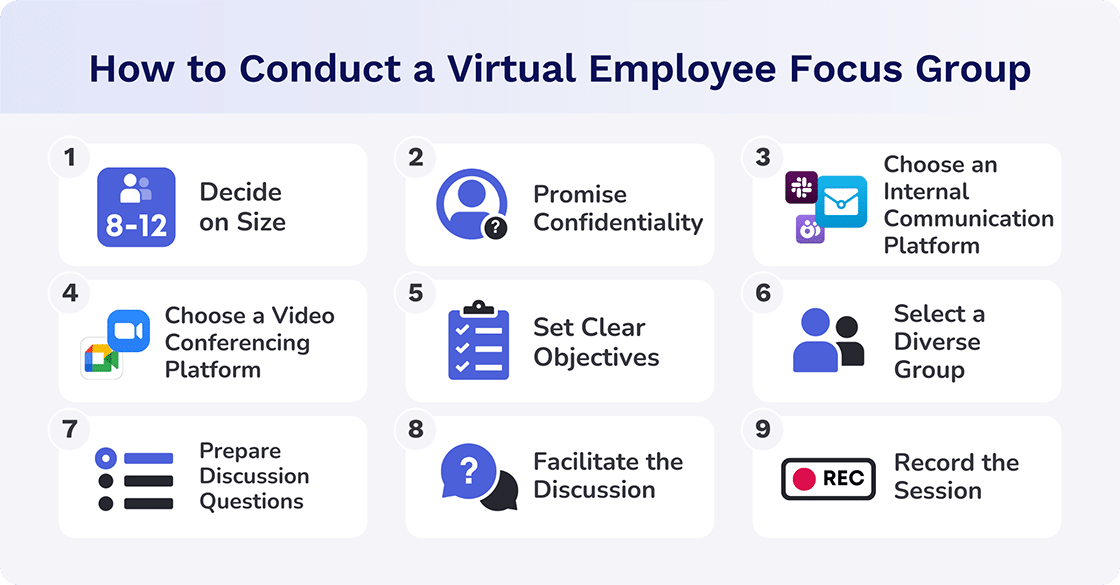
Best Practices When Developing Employee Focus Group Questions
Start by asking yourself what you want to know. That is the very best way to know what to focus on!
A structured interview guide for an employee focus group is like a roadmap. It outlines key topics you want to cover, suggests questions to spark discussion, and estimates the time that you can spend on each section. As you use it across multiple groups, it transforms from a script to a helpful checklist, guaranteeing you hit all the important points. The act of writing the guide itself becomes a valuable preparation tool, organizing your thoughts and pinpointing areas that might need further exploration during the discussion.
Here are some key tips:
- Focus on open-ended questions: Encourage elaboration and detailed responses. Then, encourage others in the group to build on these.
- Balance positive and negative feedback: Ask about what's working well and areas for improvement. You want to know both sides of the story.
- Tailor questions to your goals: Align your questions with your specific communication objectives. Only you and your team know what these are.
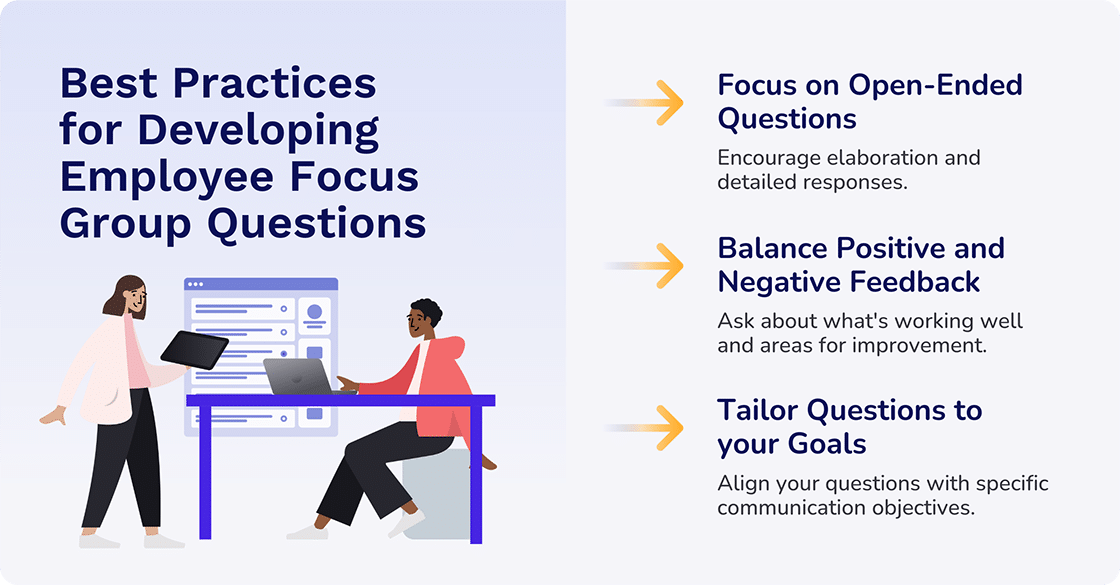
30+ Employee Focus Group Example Questions
We have categorized these questions to help you move forward. Just remember that nothing is cast in stone. You are the one who will create the best employee focus group questions for your organization.
General Communication
- How well-informed do you feel about company news and updates?
- What are your preferred channels for receiving work-related information?
- How often do you feel comfortable sharing your ideas with management?
Internal Communication Channels
- What are your thoughts on the effectiveness of our current communication channels?
- How can we improve the content or format of X ADD NAME X communication channel?
- Do you have any suggestions for new communication channels we could add?
Communication Flow
- How clear and timely is the information you receive from management? Could we do better?
- Do you feel information cascades down effectively within your team and department?
- Have you ever encountered any communication silos within the company? Can you describe them?
Employee Engagement
- How do you feel about the overall level of communication within the company?
- What can we do to encourage more active participation in communication channels?
- Do you feel comfortable raising questions or concerns through our existing communication channels?
Company Culture
- What are the core values of our company? Do you feel they are reflected in daily work practices?
- How would you describe the overall work environment here? Collaborative, competitive, or something else?
- What suggestions do you have for fostering a more positive and inclusive company culture?
Work-Life Balance
- Does your current workload allow you to maintain a healthy work-life balance?
- How effectively are company policies and benefits communicated and utilized for work-life balance?
- What additional resources or support could help employees achieve better work-life balance?
Performance Management
- How satisfied are you with the current performance feedback process?
- Do you feel your goals are clear and aligned with company objectives?
- What improvements could be made to make performance reviews more helpful and motivating?
Training and Development
- Do you feel you have the necessary skills and resources to succeed in your role?
- How well does our current training and development program prepare employees for career growth? Do you have suggestions that might improve it?
- What type of professional development opportunities would be most valuable to you?
Leadership
- How effectively does leadership communicate company vision and goals?
- Do you feel comfortable approaching your manager with questions or concerns?
- What leadership qualities do you admire most and how could they be developed further?
Technology and Tools
- How user-friendly and effective are the current communication tools we use (eg email and project management software)?
- Are there any communication tools you'd like to see implemented or improved?
- Do you feel comfortable using the technology available for communication purposes?
Information Overload
- Do you ever feel overwhelmed by the amount of information you receive through company communication channels?
- How can we improve communication to avoid information overload and ensure you receive only the most relevant information?
- What communication channels do you find most helpful for staying up-to-date without feeling bombarded?
Transparency and Trust
- How transparent do you feel leadership is in communicating company decisions and updates?
- What can we do to build greater trust and confidence in company communication?
- Are there any areas where you feel communication could be more transparent or open?
Free Employee Engagement Survey Template to Boost Productivity
Craft effective surveys to measure employee sentiment and boost engagement
.avif)
Download Free
How to Analyze Employee Focus Group Questions?
Holding an employee focus group is just the beginning. The next step is to analyze the data you have gathered. Start by listing the key points participants made and discussed. Then match these with the arguments made for and against them. You will soon see a story emerge.
Then, develop a report summarizing the findings and decide on recommendations for improvement. Share the report with relevant stakeholders and outline action steps to address the feedback.
By conducting regular employee focus groups using these tips and questions, you can gain valuable insights into your team's communication. This will help you create a more open, transparent, and engaging work environment for everyone.
How Can You Improve Focus Groups With Cerkl Broadcast?
Cerkl Broadcast Audience Manager enables you to create segments according to participation in specific employee focus groups. Seamless audience management has never been this easy!
Segmentation is dynamic. So, whenever an employee is added to a focus group, they are automatically added to the relevant segment. Audience Manager then ensures that employees continue to get relevant communications in a consistent and timely manner.
The strategy is that by making communication a breeze, you have more time to focus on the takeaways from focus groups. It means spending less time executing changes in strategy and more time focusing on learning.
What’s Next?
A well-designed employee focus group or employee engagement survey will tell you a lot. However, you might want to consider a less labor-intensive method. We want you to consider using our employee engagement survey. It will enable you to create an efficient employee engagement survey to collect answers and improve engagement. It’s quick and easy. And if you opt for an employee focus group, you can combine questions for greater effect all around.
.avif)
Free Employee Engagement Survey Template to Boost Productivity
Craft effective surveys to measure employee sentiment and boost engagement
Download Free
FAQ
What is an employee focus group? An employee focus group is a small group discussion guided by a moderator or facilitator to gather employee feedback on specific topics.
Why do organizations use employee focus groups? Organizations generally use employee focus groups to understand employee perspectives, improve communication, and gain insights for better decision-making.
What has active listening got to do with employee focus groups? Active listening is crucial in employee focus groups. The moderator needs to attentively listen to employee concerns and experiences to ensure open and honest discussions.
What are some good employee focus group questions? Good employee focus group questions are open-ended, sparking conversation and encouraging detailed responses. Examples include: "What are your biggest challenges with communication here?" or "How can we improve collaboration across departments?"






.webp)
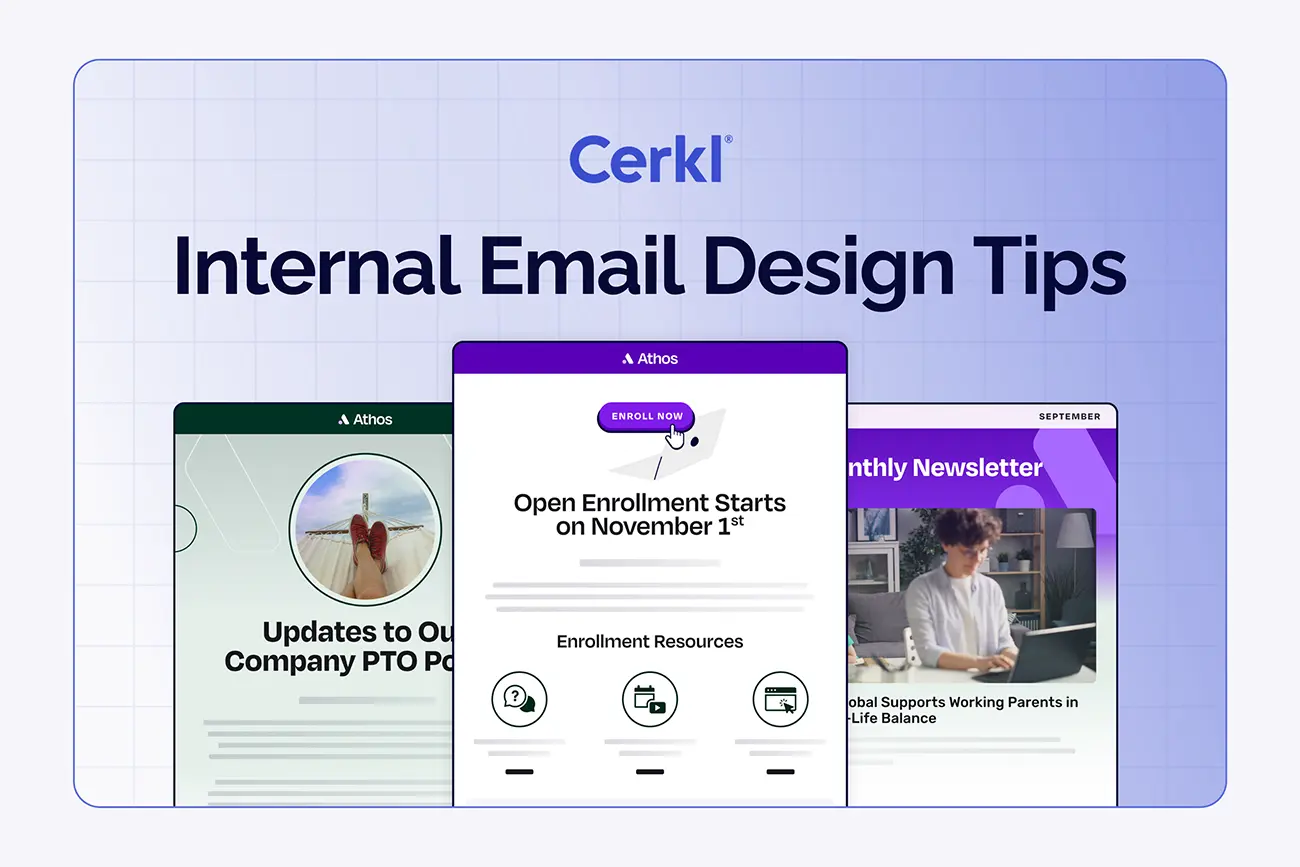
.avif)